 Petzlover
Petzlover Brittany is originated from France but Istarski Ostrodlaki Gonic is originated from Croatia. Brittany may grow 8 cm / 3 inches shorter than Istarski Ostrodlaki Gonic. Brittany may weigh 7 kg / 15 pounds lesser than Istarski Ostrodlaki Gonic. Both Brittany and Istarski Ostrodlaki Gonic has almost same life span. Both Brittany and Istarski Ostrodlaki Gonic has same litter size. Both Brittany and Istarski Ostrodlaki Gonic requires Low Maintenance.
Brittany is originated from France but Istarski Ostrodlaki Gonic is originated from Croatia. Brittany may grow 8 cm / 3 inches shorter than Istarski Ostrodlaki Gonic. Brittany may weigh 7 kg / 15 pounds lesser than Istarski Ostrodlaki Gonic. Both Brittany and Istarski Ostrodlaki Gonic has almost same life span. Both Brittany and Istarski Ostrodlaki Gonic has same litter size. Both Brittany and Istarski Ostrodlaki Gonic requires Low Maintenance.
 One of the most intense bird dog breeds in existence is the Brittany, bred for hunt. The breed used to be called the Brittany Spaniel, but since the breed is closer to a setter or pointer, that moniker has been dropped. The Brittany is named for the French Province in which they were originally developed. Sometime from the 17th to the 19th centuries, the breed was developed. Images of a very similar dog can be found on 17th century paintings and tapestries. However, the first written description comes from 1850 by a Reverend Davies, describing a hunting episode. The breed was recognized officially in the early part of the 20th century and made a splash at the 1900 Paris Dog Show.
One of the most intense bird dog breeds in existence is the Brittany, bred for hunt. The breed used to be called the Brittany Spaniel, but since the breed is closer to a setter or pointer, that moniker has been dropped. The Brittany is named for the French Province in which they were originally developed. Sometime from the 17th to the 19th centuries, the breed was developed. Images of a very similar dog can be found on 17th century paintings and tapestries. However, the first written description comes from 1850 by a Reverend Davies, describing a hunting episode. The breed was recognized officially in the early part of the 20th century and made a splash at the 1900 Paris Dog Show.
The first official standards were written in about 1907 and the breed was recognized by the American Kennel Club (AKC) in 1934.The Brittany is expected to point to and then retrieve birds and other small ground game. Because the Brittany both points and retrieves they are known in the U.K. as a Hunt, Point and Retrieve breed or an HPR, and they have more Dual Champions than the rest of the AKC Sporting group.
There are actually two types of Brittanys in the minds of many breeders. There is the “French” Brittany and the “American” Brittany. When the breed arrived in the United States in 1931 they became immensely popular in a short period of time. In 1942 American Breeders began the American Brittany Club, rewriting the French standard to fit the dog they knew. Today there are definitely difference between the two sub-sets that can easily be seen. The French dog is smaller than the American dog. The American dog is a runner pacing ahead of the hunter while the French dog works more closely with their human companions. Another visible difference is that the French accept black spotted Brittanys, while in the United States a black spotted coat is considered a fault. Both sub-sets are known for their willingness to follow human directions, their eagerness for the hunt, and their agility and speed.
Unfortunately, the European wars took their toll on this breed as they did on many others. Following the second World War, their numbers in Europe were drastically reduced. The French had stop breeding them altogether during the war. It was in this depleted gene pool that the French agreed to accept the black spotted Brittany. Along with the U.S., Canada also does not recognize the black spotted Brittany.
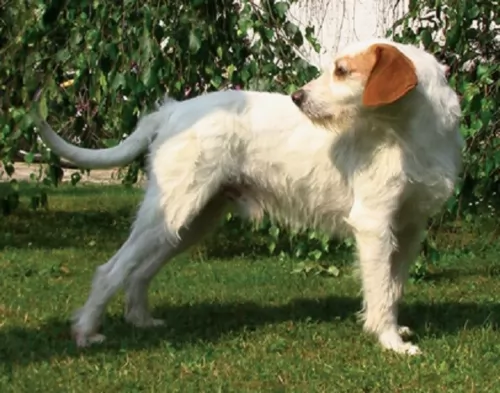 The Istarski Ostrodlaki Gonic, also referred to as the Istrian wire-haired or short-haired scenthound is a very ancient dog breed. Apparently the dog has been found in paintings that go way back to the early 1700s.
The Istarski Ostrodlaki Gonic, also referred to as the Istrian wire-haired or short-haired scenthound is a very ancient dog breed. Apparently the dog has been found in paintings that go way back to the early 1700s.
The dog can either have a short, smooth coat or a rough, wiry longer coat. He has always been popular with hunters, used for hunting rabbits and fox.
An interesting fact with this dog is the correlation between the Dalmatian dog and the Istrian short-haired hound. According to veterinary investigations, there are strong likenesses between the two breeds.
The truth is, the origin of the Istrian has been a matter of dispute for some time but in 2003 the Federation Cynologique Internationale recognized the breed as hailing from Croatia.
 The Brittany is much like other hunting dogs – pointers and retrievers – in size and stature. He is solid and strong but not heavy. He is compact with an average size head and floppy ears, docked tails or short natural tails, and expressively intelligent looking eyes. He is athletic, energetic, and alert. He has a long, elastic and free gait. The French dog is smaller and the dog with black spots is accepted. The American Brittany is larger and only a tri-color of orange, liver and white is acceptable.
The Brittany is much like other hunting dogs – pointers and retrievers – in size and stature. He is solid and strong but not heavy. He is compact with an average size head and floppy ears, docked tails or short natural tails, and expressively intelligent looking eyes. He is athletic, energetic, and alert. He has a long, elastic and free gait. The French dog is smaller and the dog with black spots is accepted. The American Brittany is larger and only a tri-color of orange, liver and white is acceptable.
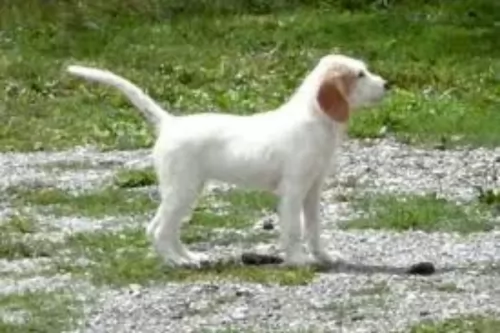 Medium in size, the Istarski Ostrodlaki Gonic stands at roughly 43 to 60cm at the withers and weighs roughly 12 to 27kg. The chest of the dog is broad and deep, the skull slightly rounded while the muzzle is strong and rectangular shaped. The nose is dark brown or black.
Medium in size, the Istarski Ostrodlaki Gonic stands at roughly 43 to 60cm at the withers and weighs roughly 12 to 27kg. The chest of the dog is broad and deep, the skull slightly rounded while the muzzle is strong and rectangular shaped. The nose is dark brown or black.
The ears are floppy and are nearly always in the orange color while the tail is long and is carried low. The coat of the rough haired dog is of medium length. In fact the coat can either be short and smooth or longish and wiry with a woolly undercoat. The color of the coat is white with orange markings.
This breed of dog is sought after for his cheerful personality. He is loyal to his human family and is a social dog, loving to spend time around his family.
He is energetic, confident and strong-willed and this is why, as with most other dogs, he will benefit from training and socialization, as this makes him obedient and responsive to his owner. He is evenly tempered, being gentle and docile.
 The Brittany is particularly trainable and friendly. They love to play and are sweet-natured. They don’t due well with harsh correction though and a stern look will cause them to wither. Socialize them young or they can become shy around strangers. They are loyal and family oriented. They can easily become attached to their humans.
The Brittany is particularly trainable and friendly. They love to play and are sweet-natured. They don’t due well with harsh correction though and a stern look will cause them to wither. Socialize them young or they can become shy around strangers. They are loyal and family oriented. They can easily become attached to their humans.
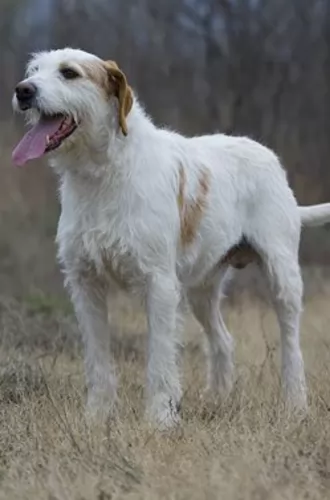 The Istrian Wire-haired Scenthound or Istarski Ostrodlaki Gonic as he is also referred to is a strong, well built hound which is elegant in appearance.
The Istrian Wire-haired Scenthound or Istarski Ostrodlaki Gonic as he is also referred to is a strong, well built hound which is elegant in appearance.
He has a remarkably striking coat - bright white with orange markings. He has always been an excellent hunting dog, even to this day. This background hunting of his will require that he receives ongoing exercise as well as mental stimulation.
Treat this beautiful dog well - exercise him, groom him, feed him well and love him and you will be rewarded with the loyal and devoted friendship of an amazing dog.
 The breed is a hardy one and Brittanys are mostly healthy dogs. In Europe 1 in 5 dogs dies of old age and that age is usually 14 or 15 years. They do have a few issues that they may be susceptible to. These would include:
The breed is a hardy one and Brittanys are mostly healthy dogs. In Europe 1 in 5 dogs dies of old age and that age is usually 14 or 15 years. They do have a few issues that they may be susceptible to. These would include:
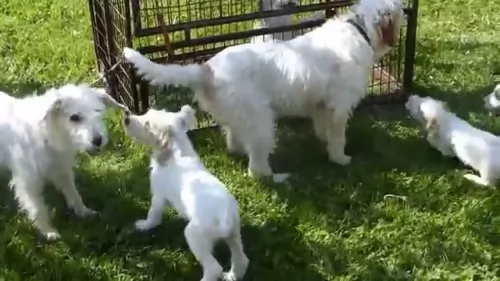 There are people who don’t take dental disease seriously in dogs as they think that it simply affects the teeth, when in fact dental disease can affect the dog’s entire body.
There are people who don’t take dental disease seriously in dogs as they think that it simply affects the teeth, when in fact dental disease can affect the dog’s entire body.
Dental- and gum disease is to be regarded with concern as it can be painful and even life threatening. It affects many dogs, and unfortunately your Istarski is also likely to have problems with his teeth. Tartar build-up and infection of the gums can lead to tooth loss but also damage to the kidneys, heart and joints.
Dogs need to have their teeth attended to regularly and if this is something new to you, speak to your vet and find out about special canine toothpaste and toothbrush and how to use them.
Dogs can be susceptible to bacterial and viral infections such as rabies, distemper and parvo, and that is why visits to your vet are so important. These life-threatening diseases for your Istarski Ostrodlaki Gonic are preventable through vaccinations.
 Don’t overfeed your Brittany. Keep him at hunting weight by feeding a half a cup up to 2 cups per day depending on the size of your dog and activity levels. Serve this in two meals not one.
Don’t overfeed your Brittany. Keep him at hunting weight by feeding a half a cup up to 2 cups per day depending on the size of your dog and activity levels. Serve this in two meals not one.
Ears – prone to infections – make sure that you check them and wipe them out routinely to prevent infections.
Hip Dysplasia – bones don’t fit well into joints – this can be genetic or otherwise, causing lameness and arthritis. If severe it can require surgery to correct.
Epilepsy – mild or serious seizures are possible. This can be genetic/hereditary but is set off by an infectious disease of the brain, head injury, poison, tumor, or metabolic disorder. There is no cure, but medication can be very effective.
Hypothyroidism – Low levels of thyroid hormone – can cause drooping eyelids, obesity, lethargy, mental difficulties or irregular heat cycles or all of this. Medication is available as it is for humans but must be taken daily for the rest of the dog’s life
Canine Discoid Lupus Erythematosus – autoimmune disease that is rare in dogs. Cats and humans can also have it. It is a skin disease and does not become the more serious and deadly Systemic Lupus. The Discoid version of this disease causes loss of pigmentation and a scaling on the nose which can then progress to the skin around the ears, eyes and genitals. There could be ulcerated lesions and tissue death in more severe cases. Sun exposure can make the condition worse.
The Brittany is a hunting dog that acts like a pointer but will retrieve fowl and birds in the water or on land. If you don’t hunt, the Brittany can still be your family dog. They need lots of exercise and mental stimulation. They need a job if they are not going to hunt and expect them to be distracted by every bird they see. Try flyball, agility, FAST CAT, field trials and dock diving. They are very task oriented and have boundless energy. They excel at obedience and confirmation as well.
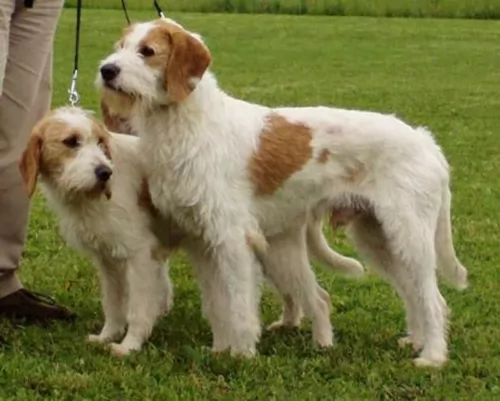 Taking care of an Istarski Ostrodlaki Gonic dog is much like caring for a child – doing everything you can to keep him healthy and happy, after all, he is a member of your family.
Taking care of an Istarski Ostrodlaki Gonic dog is much like caring for a child – doing everything you can to keep him healthy and happy, after all, he is a member of your family.
You want to be watching his diet and making sure that it is the best quality there is, full of vitamins and minerals to keep his eyes bright, his nose wet and his tail wagging.
There are excellent commercially manufactured dog foods on the market today and the best ones ensure excellent nutrition for your dog to keep him in optimal condition through each stage that he goes through. Try to include some home-made food into this kibble such as cooked chicken, brown rice and vegetables and it can be to his benefit to just to include some raw meat from time to time.
Make sure your Istarski Ostrodlaki Gonic is well exercised, that you check his teeth and ears to ensure there are no infections and to call the vet immediately you suspect something is wrong. Make sure you have him examined as a puppy and that he gets his necessary injections as there are diseases that can kill your dog.